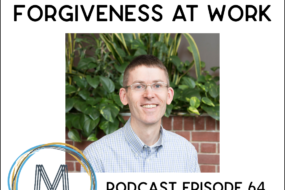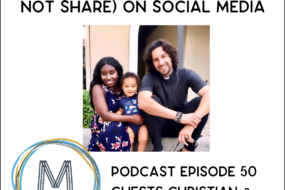January 12, 2017 • Life for Leaders
And when you stand praying, if you hold anything against anyone, forgive them, so that your Father in heaven may forgive you your sins.
Mark 11:25
 One of the reasons many of us struggle with forgiveness is that we misunderstand what it is . . . and what it is not. Yet, if we are going to follow Jesus’s teaching and forgive others so that God might forgive us, then we had better know what we should do . . . and not do.
One of the reasons many of us struggle with forgiveness is that we misunderstand what it is . . . and what it is not. Yet, if we are going to follow Jesus’s teaching and forgive others so that God might forgive us, then we had better know what we should do . . . and not do.
Let me start with what forgiveness is not. It is not saying, “That’s okay” or “No problem.” If somebody has done something wrong to you or anyone else, that’s not okay. It is a problem, not just a relational problem, but also a spiritual problem, something we call sin. Forgiveness assumes that somebody did something wrong and this wrong should not be ignored.
Forgiveness is also not the same as understanding why somebody did something to hurt you. Yes, understanding can help us on the way to forgiveness and reconciliation, but it’s not the same as forgiveness.
Forgiveness is not the same as feeling better. Often we forgive when we’re still feeling the sting of the offense. Forgiveness can, in fact, help us feel better. But it isn’t a feeling. It’s a choice, an act of will.
But a choice to do what? Again, not to say, “I understand” or “That’s okay.” Rather, forgiveness is a choice to respond to an injury or offense, something that does indeed hurt, by deciding not to let the offense be a barrier in relationship. It’s saying, in effect, “Yes, what you did hurt me, but I am choosing not to let it come between us. I will not let this wrong become a brick in a wall that separates us.”
Forgiveness opens up the possibility of reconciliation, but is not reconciliation. That requires appropriate action on the part of the offender. Reconciliation requires two parties choosing to reconcile. But forgiveness is something we can and should offer as a first step in the process of reconciliation.
QUESTIONS TO CONSIDER:
How do you understand forgiveness?
Can you think of people in your life that you have not forgiven for ways they have wronged you? Why have you not forgiven them?
In particular, are there people in your workplace whom you need to forgive?
If you’re struggling with forgiveness, are you willing to ask God for help?
PRAYER:
Gracious God, you make it clear that we are to forgive those who have hurt us. And, in Christ, you set the example for us, showing us how to forgive and mending our hearts so that we might imitate his example. Help us, Lord, to be people who forgive. Help us especially when it is hard to forgive, when we want to build a barrier between ourselves and the offender, when we want to guard our hearts from further hurt.
As we forgive, Lord, may we experience more profoundly the forgiveness you offer to us in Christ.
All praise be to you, loving, forgiving God. Amen.
Explore more at the Theology of Work Project online Bible commentary: Forgiveness and Accountability in the Workplace

Dr. Mark D. Roberts is a Senior Strategist for Fuller’s Max De Pree Center for Leadership, where he focuses on the spiritual development and thriving of leaders. He is the principal writer of the daily devotional, Life for Leaders, and the founder of the De Pree Center’s Flourishing in the Third Third of Life Initiative. Previously, Mark was the Executive Director of the De Pree Center, the lead pastor of a church in Southern California, and the Senior Director of Laity Lodge in Texas. He has written eight books, dozens of articles, and over 2,500 devotions that help people discover the difference God makes in their daily life and leadership. With a Ph.D. in New Testament from Harvard, Mark teaches at Fuller Seminary, most recently in his D.Min. cohort on “Faith, Work, Economics, and Vocation.” Mark is married to Linda, a marriage and family counselor, spiritual director, and executive coach. Their two grown children are educators on the high school and college level.






Forgiveness is not easy to comprehend or to accomplish. As Mark said, there are many misunderstandings of the subject. Mark gave some good advice, but I’m not sure I’d go along with his statement: ““Yes, what you did hurt me, but I am choosing not to let it come between us. I will not let this wrong become a brick in a wall that separates us.” Hmmm…If a man beats his wife, does that not come between them, is it not a brick in the wall—and should be? In this situation (and many others), there will be a breaking of relationship. But forgiveness removes the hate, the desire for vengeance, the guilt and shame thrown back on the innocent party. But without a change on the part of the perpetrator of wrong, the relationship remains broken—and that is good.
Lee, thanks for your comment. What you describe is what I was trying to say with the brick analogy. Perhaps that analogy wasn’t clear or helpful.
I don’t think I would say, however, that the broken relationship is good. It may be necessary if the perpetrator is unwilling to repent, change, etc. Sometimes reconciliation is just not possible because it takes two to reconcile.
When it comes to the “little things” in a secular work situation, there is often a different opinion on whether something is actually a sin that needs to be forgiven. Sometimes it’s harder to forgive someone who thinks whatever happened was”no big deal.”
Yes, you’re right. We do tend to minimize some wrongs. And, I expect, sometimes we maximize others. Thanks for your note, Nancy.
i think the forgiveness issue is non-applicable in this day and age considering the hypocrisy of todays self-professed christians
Thanks for offering your perspective.
Well, surely there are some who call themselves Christians who are not seeking to be guided by Scripture in the matter of forgiveness. But I would hope that there are still Christians for whom the call to forgive is relevant because they are truly seeking to live as disciples of Jesus.